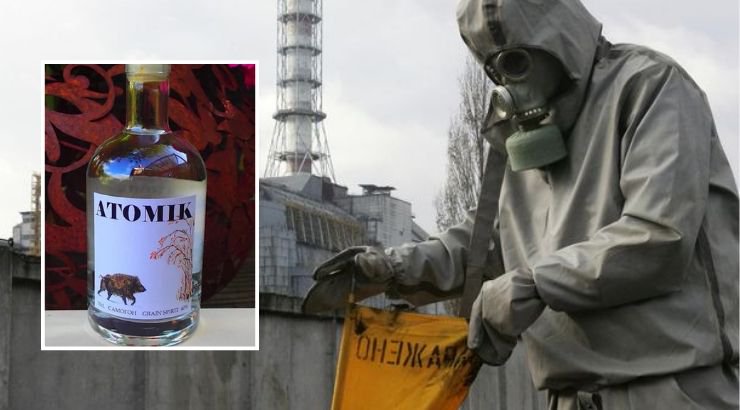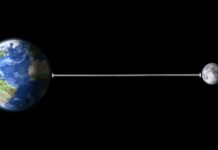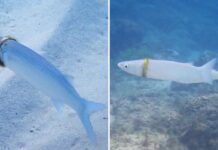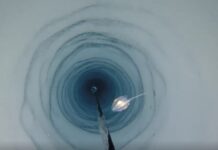Scientists have produced artisan Vodka with ingredients from the Chernobyl exclusion zone and they insist that it’s safe to drink.
Typically when a new brand of vodka is rolled out, manufacturers like to promote the pristine nature of its ingredients: the highest quality grains, the mineral-rich artesian mountain spring water, the meticulous distilling and filtering process.
But for one new brand of vodka, its team of makers have found a different promotional approach and are stressing that this is the first “artisan vodka” that originates from a nuclear disaster site.
Introducing ATOMIK Vodka, the first consumer product to come from the forbidden zone of Ukraine’s Chernobyl since the area was devastated by a nuclear disaster in 1986.
The vodka is the result of years of work by a group of researchers who have long worked in the exclusion zone, tracking the recovery of the land surrounding the disaster site.
The faulty nuclear reactor near the city of Pripyat remains surrounded by 1,003 square miles (2,600 square kilometers) of restricted access, known as the Chernobyl Exclusion Zone and the Zone of Obligatory Resettlement. New investment and use of agricultural land remain forbidden within the zone.
But according to the team of scientists behind ATOMIK, the new liquor is completely safe for consumers to drink—in moderation, of course. The researchers spent three years looking into the transfer of radioactivity to crops in the restricted zone.
Professor Jim Smith of South England’s University of Portsmouth, who has worked alongside the team, hopes that proceeds from ATOMIK can further boost the economic recovery of communities living in the blighted region. The Chernobyl Spirit Company manufacturing ATOMIK plans to give 75 percent of all profits back to local communities.
I just had some of that atomik vodka from #Chernobyl. The scientists say the glowing green ring I have now is normal. #atomik #vodka pic.twitter.com/MR90yp9jMh
— Winks Awakening (@winksgaming) August 29, 2019
Smith noted:
“After 30 years, I think the most important thing in the area is actually economic development, not the radioactivity.”
While the team did detect radioactivity in the grain, the vodka remains entirely safe to drink. A spokesperson at the University of Portsmouth explained:
“Strontium-90 is slightly above the cautious Ukrainian limit of 20 Bq/kg.
But, because distilling reduces any impurities in the original grain, the only radioactivity the researchers could detect in the alcohol is natural Carbon-14 at the same level you would expect in any spirit drink.”
The team used mineral water from an aquifer deep in the town of Chernobyl to dilute the distilled alcohol. The water, which was found to be free of contamination, had similar chemistry from the famously immaculate groundwater in France’s Champagne region, where the famous sparkling wine originates from.
Smith told the BBC:
“[ATOMIK] is no more radioactive than any other vodka.
Any chemist will tell you, when you distill something, impurities stay in the waste product. So we took rye that was slightly contaminated and water from the Chernobyl aquifer and we distilled it.
We asked our friends at Southampton University, who have an amazing radio-analytical laboratory, to see if they could find any radioactivity. They couldn’t find anything—everything was below their limit of detection.”
Smith hopes that the new liquor —which he sees as “the most important” in the world—can help carve out some space for development that would benefit locals. He explained:
“We don’t think the main Exclusion Zone should be extensively used for agriculture as it is now a wildlife reserve … But there are other areas where people live, but agriculture is still banned.
33 years on, many abandoned areas could now be used to grow crops safely without the need for distillation.
We aim to make a high-value product to support economic development of areas outside the main Exclusion Zone where radiation isn’t now a significant health risk.”
Oleg Nasvit, the first deputy head of the State Agency of Ukraine for Exclusion Zone Management, has welcomed the findings by Smith and his team. Nasvit said:
“It is important that we do everything we can to support the restoration of normal life in these areas whilst always putting safety first.”
As far as ATOMIK’s quality as a vodka is concerned, Nasvit is similarly supportive but offers a caveat:
“I’d call this a high-quality moonshine—it isn’t typical of a more highly purified vodka, but has the flavor of the grain from our original Ukrainian distillation methods—I like it.
Only one bottle of ATOMIK has been produced thus far as proof of concept, but the team at Chernobyl Spirit Company hopes to produce about 500 by the end of the year to sell to the influx of tourists who are flocking to the exclusion zone.
Source: https://themindunleashed.com/2019/09/atomik-vodka-chernobyl.html






